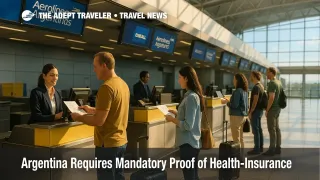Argentina Tightens Entry Rules With Mandatory Health-Insurance Proof

Argentina is now enforcing a law that obliges all foreign visitors to show proof of valid health insurance on arrival. The measure, published in Decree 366/2025 on May 28 and in force since July 1, 2025, aims to shield the public health budget from the cost of treating uninsured visitors. Travelers who cannot present a policy that covers medical care for the full stay will be refused entry. U.S. citizens should act before departure, because most domestic health plans offer little or no protection overseas, while Medicare provides almost none.
Key Points
- Why it matters: Admittance now hinges on carrying verifiable health coverage that is valid in Argentina.
- The decree requires each visitor to declare they hold health insurance before boarding. Airlines have begun asking for proof, but official carrier guidance remains Unverified.
- Argentina joins Cuba and the United Arab Emirates in mandating insurance at the border.
- Original Medicare does not pay for care abroad; most U.S. employer or marketplace plans reimburse only limited emergency costs.
- Comprehensive travel insurance bundles health, evacuation, and trip-interruption benefits, usually costing 5 %-10 % of total trip value.
Snapshot
Under the updated Law 25.871, immigration officers can refuse entry-or order immediate removal-if a visitor lacks health coverage. Permanent residents and citizens are exempt. The new rule reflects a broader regional push to shift medical costs back onto travelers and insurers after pandemic-era shortfalls strained public hospitals. U.S. travelers heading south during the upcoming austral spring shoulder season should secure a policy that lists Argentina among covered destinations and meets typical minimums: at least $50,000 for medical expenses and $100,000 for medical evacuation.
Background
How ordinary U.S. health insurance performs overseas
Employer and marketplace plans focus on in-network providers at home. Outside the United States they usually:
- Treat foreign hospitals as out-of-network, triggering the highest deductibles and coinsurance.
- Require you to pay all costs upfront, then file for partial reimbursement.
- Exclude medical evacuation, which the U.S. State Department notes can exceed $50,000 for an air ambulance back to the United States.
Medicare and Medigap
- Original Medicare: Covers care abroad only in three narrow border or cruise scenarios. Routine overseas treatment is excluded.
- Medicare Advantage: Most plans mirror Medicare's limits, though a few offer a modest foreign-emergency rider.
- Medigap Plans C, D, F, G, M, N: Reimburse 80 % of emergency expenses abroad (up to $50,000 lifetime) after a $250 deductible.
Older Americans therefore need a stand-alone travel policy or a Medigap plan with foreign coverage.
Latest Developments
Carriers step up document checks
Some international airlines serving Buenos Aires' Ezeiza International Airport (EZE) report they will deny boarding to passengers without printed or digital proof of insurance. Travelers should carry a certificate showing the insured names, policy number, coverage limits, and Argentina as a covered territory.
Insurers roll out Argentina-specific riders
Several U.S. travel-insurance underwriters now advertise "Argentina-compliant" policies that bundle at least $50,000 in primary medical coverage with medical evacuation and repatriation. Many allow same-day purchase up to departure time, but coverage takes effect only once payment clears.
Digital wallets gain traction for proof
Insurance firms are adding Apple Wallet and Google Wallet passes that display key policy data offline-useful at remote land crossings. Border agents are accepting these passes when the QR code links to the insurer's verification portal.
Analysis
Argentina's mandate spotlights a long-standing gap in U.S. consumer awareness. Surveys by the U.S. Travel Insurance Association found that fewer than 30 % of American travelers realize their domestic medical plan may not pay abroad. Yet hospital stays routinely top $3,000 USD per day in private clinics across South America, and evacuation flights back to Miami or Houston can run $100,000 USD when staffed with critical-care teams. Relying on credit cards for travel protection is risky: many cards cap medical benefits at $2,500 or cover only trip cancellation.
A full travel-insurance policy folds medical, evacuation, baggage, and trip-disruption cover into one contract. Prices vary by age and trip cost, but a healthy 40-year-old spending $2,500 on a one-week trip will pay about $125 USD for a mid-tier plan. Policies should be primary-not secondary-to domestic insurance so that claims are processed directly with the overseas hospital. Emergency-assistance hotlines-available 24 / 7 in English and Spanish-coordinate care, guarantee payment, and arrange medical repatriation. Travelers can compare plans on aggregator sites or consult a licensed advisor; reading exclusions for pre-existing conditions and adventure sports is critical.
Final Thoughts
Argentina's enforcement is a timely reminder that standard U.S. health coverage rarely crosses borders. Packing a robust travel-insurance policy is no longer optional-it is the key to compliance, financial protection, and peace of mind under Argentina's new health-insurance requirement.
Sources
- Decreto 366/2025, Boletín Oficial de la República Argentina - health-insurance declaration for foreign entrants
- Medicare.gov - "Travel outside the U.S." overview of Medicare limits
- Medicare.gov - Medigap policies and foreign-emergency benefits (PDF)
- U.S. Department of State - "Insurance Coverage Overseas" advisory
- U.S. Department of State - Traveler's Checklist: medical-evacuation cost examples
